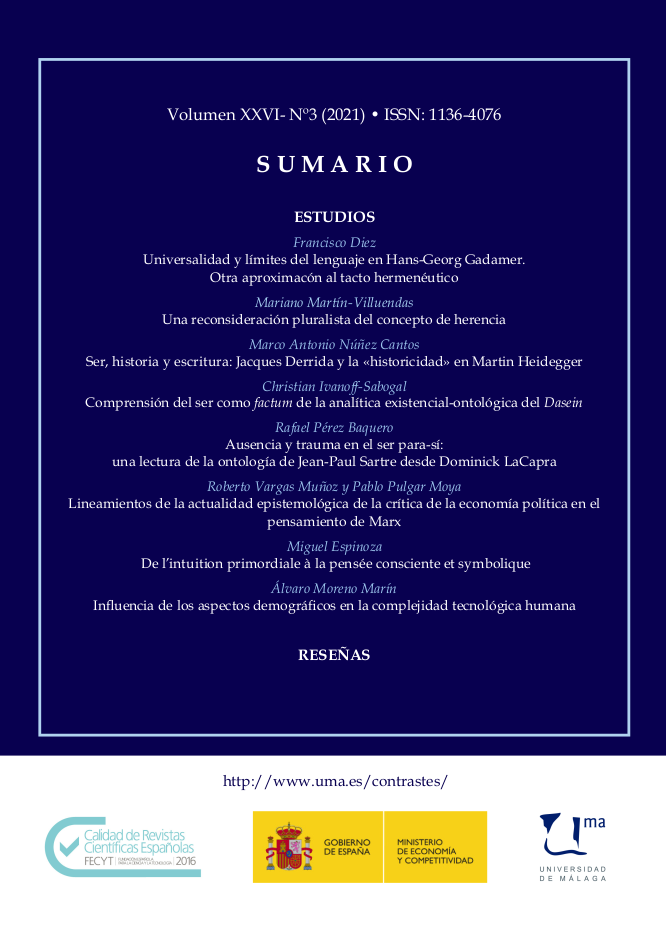Absence and trauma in the being for-it-self: A reading of Jean-Paul Sartre’s ontology from Dominick LaCapra
DOI:
https://doi.org/10.24310/Contrastescontrastes.v26i3.10399Keywords:
trauma, absence, Sartre, being for-it-self, intersbujectivityAbstract
This paper aims at delving further into the notions of Sartre´s ontological phenomenology by means of hermeneutic analysis provided by Dominick LaCapra’s intellectual history. LaCapra’s ideas stand out for its potentiality when it comes to address how some intellectuals from the 20th have dealt with the experience of violence and uncertainty stemming from their historical context. With a view to taking forward this hermeneutic background, this paper explores Sartre’s ideas on the being of consciousness, intersubjectivity and the existential project by endorsing the lens provided by LaCapra’s works.
Downloads
Metrics
Publication Facts
Reviewer profiles N/A
Author statements
Indexed in
-
—
- Academic society
- N/A
- Publisher
- Universidad de Málaga
References
ARIAS, M. 1987: Jean-Paul Sartre y la dialéctica de la cosificación. Madrid: Cincel.
ARONSON, R. 1971: «Sartre´s Individualist Social Theory», en Telos. No. 16, pp. 68-91.
AUDRY, C. 1975: Sartre y la realidad humana. Madrid: EDAF.
BEAUVOIR, S. 1961: Jean Paul Sartre versus Maurice Merleau-Ponty. Buenos Aires: Siglo XX.
CARUTH, C. 2017: Unclaimed Experience: Trauma, Narrative, and History. Baltimore: John Hopkins University Press.
COHEN-SOLAL, A. 2005: Sartre 1905-1980. Madrid: Edhasa.
CROWELL, S. 2012: The Cambridge Companion to Existentialism. Cambridge: Cambridge University Press.
DAVIS, C. 2007: «Sartre´s Living Dead», en Haunted Subjects. Deconstruction, Psychoanalysis and the Return of the Dead. Hampshire: Palgrave, pp. 43-65.
DAVIS, C. 2018: Traces of War. Interpreting Ethics and Trauma in Twentieth-Century French Writing. Liverpool: Liverpool University Press.
DERRIDA, J. 1997: Mal de archivo. Una impresión freudiana. Madrid: Trotta.
JAMESON, F: «Sartre and History», en Marxism and Form. Twentieth-Century Dialectical Theories of Literature. New Yersey: Princeton University Press, pp. 206-305.
JAY, M. 1984: «From Totality to Totalization: The Existentialist Marxism of Jean-Paul Sartre», en Marxism and Totality. The Adventures of a Concept from Lukács to Habermas. California: University of California Press, pp. 331-360.
KLEINBERG, E. 2006. «Jean-Paul Sartre», en Generation Existential. Heidegger Philosophy in France, 1927-1961. Ithaca: Cornell University Press.
KRAMER, L. 1989: «Literature, Criticism, and Historical Imagination: The Literary Challenge of Hayden White and Dominick LaCapra», en HUNT, L. (ed.) The New Cultural History. Berkeley: University of California Press, pp. 97-130.
LACAPRA, D. 1978: A Preface to Sartre. London: Methuen & Co.
LACAPRA, D. 1983: Rethinking Intellectual History: Texts, Contexts, Language. Ithaca: Cornell University Press.
LACAPRA, D. 1992: «Representing the Holocaust: Reflections on the Historians’ Debate», en FRIEDLÄNDER, S. (ed.) Probing the Limits of Representation. Nazism and the Final Solution. Cambridge: Havard University Press, pp. 108-127.
LACAPRA, D. 1998: History and Memory after Auschwitz. Ithaca: Cornell University Press.
LACAPRA, D. 2004: History in Transit. Experience, Identity, Critical Theory. Ithaca and London: Cornell University Press.
LACAPRA, D. 2009: History and its limits. Human, animal, violence. Ithaca and London: Cornell University Press.
LACAPRA, D. 2014: Writing History, Writing Trauma. Baltimore: The John Hopkins University Press.
LACAPRA, D. 2016: Historia, literatura, teoría crítica. Barcelona: Bellaterra.
LACAPRA, D. 2018: Understanding Others. Peoples, Animals, Pasts. Ithaca and London: Cornell University Press.
LEVY, B. 2001: El siglo de Sartre. Barcelona: Ediciones b.
MORENO, C. 2000: Fenomenología y Filosofía Existencial. Vol II. Madrid: Sintesis.
NORRIR, C. 1982: Deconstruction. Theory & Practice. New York and London: Routledge.
OVEGAARD, S. 2013: «The Look», en CHURCHIL, S; REYNOLDS, J. (eds.): Jean-Paul Sartre: Key Concepts. New York and London: Routledge, pp. 106-117.
POSTER, M. 1973: Existential Marxism in Postwar France. From Sartre to Althusser. New Jersey: Princeton University Press.
RICHMOND, S. 2013: «Nothingness and Negation», en CHURCHIL, S; REYNOLDS, J. (eds.): Jean-Paul Sartre: Key Concepts. New York and London: Routledge, pp. 93-105.
SARTRE, J. P. 1960: La república del silencio. Buenos Aires: Losada. SARTRE, J. P. 1949: Les situations III. Paris: Gallimard.
SARTRE, J. P. 2003: La trascendencia del ego. Madrid: Síntesis. SARTRE, J. P. 1996: La trascendance de l´ego. Paris: Vrin.
SARTRE, J. P. 2004: El existencialismo es un humanismo. Madrid: Edhasa. SARTRE, J. P. 1945: L’existentialism est un humanismo. Paris: Nagel.
SARTRE, J. P. 2013: El Ser y la Nada. Ensayo de ontología fenomenológica. Buenos Aires: Losada. SARTRE, J.P. 1943. L´être et le néant. Essai d’ontologie phénomenologique. Paris: Gallimard.
SARTRE, J.P. 2008: Between Existentialism and Marxism. London and New York: Verso.
SARTRE, J.P. 2008: La Náusea. Buenos Aires: Buenos Aires. SARTRE, J. P. 1938: La Nausee. Paris: Gallimard.
SARTRE, J.P. 2017: Las palabras. Buenos Aires: Losada. SARTRE, J. P. 1964: Let Mots. Paris: Gallimard.
SARTRE; J. P. 2005: A puerta cerrada. Buenos Aires: Losada.
Downloads
Published
How to Cite
Issue
Section
License
This journal provides immediate free access to its content under the principle of making research freely available to the public. All content published in Contrastes. Revista Internacional de Filosofía, are subject to the Creative Commons Attribution-NonCommercial-ShareAlike 4.0 license whose full text can be found at <http://creativecommons.org/licenses/by-nc-sa/4.0>
It is the responsibility of the authors to obtain the necessary permissions of the images that are subject to copyright.
Authors whose contributions are accepted for publication in this journal will retain the non-exclusive right to use their contributions for academic, research and educational purposes, including self-archiving or repository in open access repositories of any kind.
The electronic edition of this magazine is edited by the Editorial Service of the University of Malaga (Uma Editorial), being necessary to cite the origin in any partial or total reproduction.










5.png)
